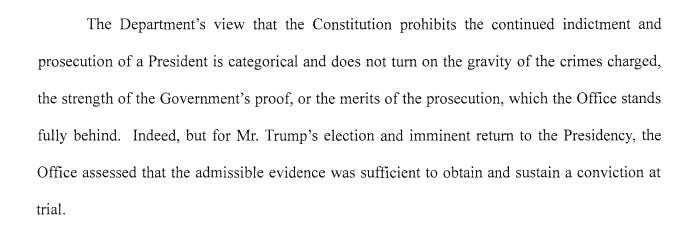Why did the DoJ prosecution of Trump run out of time?
How was Trump able to time-out a significant prosecution?
The volume of the United States Department of Justice (DoJ) report dealing with the prosecution of Donald Trump over the event of 6 January four years ago has just been published.
It will take time to digest - and please note this blog is not written by an American lawyer.
But there is one key question that has to be asked of the report and the failed prosecution it details and describes.
And it goes to the last portion of the report:
“but for Mr. Trump's election and imminent return to the Presidency, the Office assessed that the admissible evidence was sufficient to obtain and sustain a conviction at trial.”
This balanced CNN report from earlier this year provides informed views as to the delays, with defenders and critics of the DoJ process both quoted.
My preliminary view as a commentator on litigation matters is that the prosecution underestimated the effective lawyering of Trump’s advisers and also underestimated how the courts may go against them.
They had what seemed a one-sided litigation strategy - that is to say, not a meaningful litigation strategy at all.
If a party to a dispute has absolute control over events, it does not need a strategy.
A litigation strategy instead is needed so as to anticipate and deal with what the other parties can and will do, and what the courts can and will do.
Trump’s lawyers had a strategy of delay and obstruction - and it worked very effectively, at least with the federal prosecutions (though not entirely, of course, with the New York fraud prosecution, though they still ensured the sentencing there was too late so as to be meaningless).
Not for the first time, those who though they had the measure of Trump underestimated his sheer will for survival.





To understand this fully, what US statute of limitation applies to this federal offence - as some offences are not time barred?
Without in anyway disputing the author's conclusion that the prosecution failed to have a litigation strategy I wonder if the following did not also play a part:
a. immediately after the 2020 election Donald Trump seemed to be a failed politician and it was not reasonably expected he would come back as Republican presidential candidate. In those circumstances to immediately launch a prosecution had the potential to seem vindictive and liable to trigger a cycle of politically motivated prosecutions
b. evidence gathering takes time and the ongoing but slow moving congressional inquiry was clearly of assistance
c. it was only when Trump started his resurgence and the Republican Party bowed down before him that there was any urgency to the prosecution.